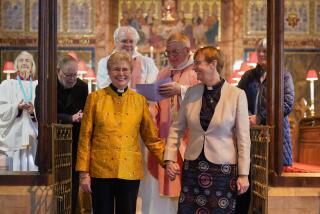Streamlining a Sacred Text
- Share via
LONDON — The Lord’s Prayer, one of the cornerstones of Christianity, has become the focus of a religious donnybrook pitting traditionalists against modernists in Britain’s official Church of England.
Should prayer use powerful rhetorical language, or should it be simple, direct and accessible?
That is the question facing leaders of the Church of England and being echoed in other Christian denominations around the world also seeking ecumenical agreement and a common Lord’s Prayer for the new millennium.
Judging it an investment in the future, a synod of British bishops meeting in London this month voted 272 to 68 to accept a modern version for new church prayer books.
“It is important that we agree on a Lord’s Prayer that can be taught to children. It embodies the values that bind society,” said Canon Stephen Oliver at St. Paul’s Cathedral here.
A recent poll showed that 80% of Britons could recite the traditional version of the prayer. But among those 16 to 25 years old, only half knew it.
The prayer, which Christians believe is the only one that Christ himself taught, is taken from the gospels of Matthew and Luke. English translations derived across the centuries from the original Greek are open to reinterpretation, the overwhelming majority of bishops agreed.
Out then, with “and lead us not into temptation,” used in Anglican churches since the 16th century days of church-splitter Henry VIII. The 21st century replacement is “save us from the time of trial.”
New Age Anglicans will no longer forgive those “who trespass against us.” Rather, they will forgive “those who sin against us.”
Our Father no longer art in heaven. He is just there, verb-lessly, in a translation originally produced in 1975. The biblical “thy” and “thine” are swapped for the more colloquial “you” and “yours.”
Supporters say the changes not only make the prayer more approachable but make clearer the meaning of the original Greek texts.
“The key word ‘trial,’ for example, is much closer than ‘temptation,’ ” Oliver said.
“Give us today our daily bread” is also better than “Give us this day our daily bread,” according to the majority of the English bishops, who represent 26 million British members of a the 70-million-strong Anglican communion around the world.
Sharp differences of opinion, though, have not been limited to the synod or to the Church of England.
A Greek-speaking representative of Eastern Orthodox churches at the synod, for example, protested the changes, saying the old translation was more accurate.
*
Bishop of Salisbury David Stancliffe, chairman of the commission that represented the reworked prayer, said history is dotted with updated translations.
English translations of the prayer, he noted, predate those in other major European languages, such as French and Italian.
“My own diocese is happy with the traditional version,” Stancliffe said, “but I see the importance of having the new wording in urban areas where people are not regular churchgoers and would welcome more accessible language.”
Bishop of Norwich Peter Nott, a leading traditionalist voice, disagreed, calling the Lord’s Prayer a “landmark of great importance for the soul.”
“Occasional worshipers . . . cannot say by heart the new version. . . . They are literally lost for words and so, too often, feel excluded by the church,” Nott said.
The English church’s plan is to include the new version, also under consideration by Roman Catholics as well as other Protestant denominations, in the revised Anglican “Book of Common Worship” to be issued for the millennium.
*
Change may be on the way, but worshipers could encounter the traditional version prayed from the altar for years to come, and it will survive in print as well.
Modification of the new version within the church is also still possible, and opposition among some Anglican laymen promises to be unflagging.
Anthony Kilmister, lay chairman of the traditionalist Prayerbook Society, believes that the church is wrong to abandon historic texts.
The issue, he said, is not to make the Lord’s Prayer accessible “in the language of supermarkets” but to preserve its traditional beauty and rolling cadence as found in the 1662 “Book of Common Prayer.”
Rewording the Lord’s Prayer, Kilmister said, is a craven surrender to political correctness: “mutilation of the nation’s liturgical inheritance.”
Don’t look for any quick “Amen” to this father of all prayer battles.
“The Lord’s Prayer is one of the simplest prayers to pray, but exploring it is a great mystery,” said Canon Oliver at St. Paul’s.
(BEGIN TEXT OF INFOBOX / INFOGRAPHIC)
Reshaping a Cornerstone
The Church of England--along with other Protestant denominations and the Roman Catholic Church--is weighting a modernized version of the venerated Lord’s Prayer as Christianity enters a new millenium.
Traditional Version
Our Father, who art in heaven, hallowed be they name.
Thy kingdome come, thy will be done on Earth as it is in heaven.
Give us this day our daily bread and forgive us our trespasses as we forgive those who trespass against us.
And lead us not into temptation, but deliver us from evil.
For thine is the kingdom and the power and the glory forever.
Amen.
Modern Version
Our Father in heaven, hallowed be your name, your kingdom come, your will be done on Earth as it is in heaven.
Give us today our daily bread.
Forgive us out sins as we forgive those who sin against us.
Save us from the time of trial, and deliver us from evil.
For the kingdom, the power and the glory are yours now and forever.
Amen
More to Read
Sign up for Essential California
The most important California stories and recommendations in your inbox every morning.
You may occasionally receive promotional content from the Los Angeles Times.













